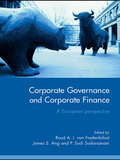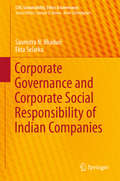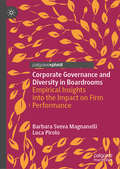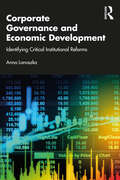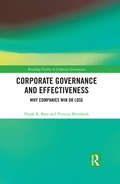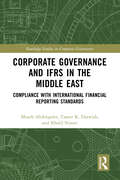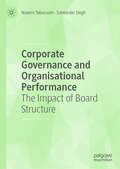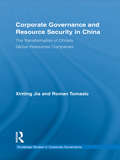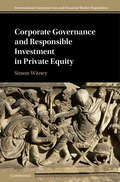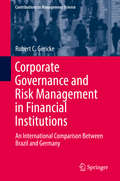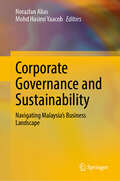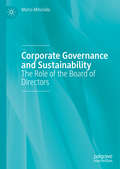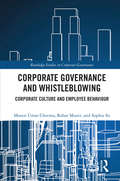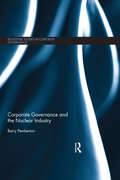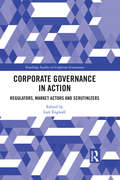- Table View
- List View
Corporate Governance and Corporate Finance: A European Perspective
by James S. Ang Ruud A. I. Van Frederikslust P. Sudi SudarsanamRuud. A. I. van Frederikslust, Associate Professor of Finance, Rotterdam School of Management, Erasmus University Rotterdam James S. Ang, Bank of America Eminent Scholar, Professor of Finance, College of Business, The Florida State University Sudi Sudarsanam, Professor of Finance & Corporate Control, School of Management, Cranfield University Ruud. A. I. van Frederikslust, Associate Professor of Finance, Rotterdam School of Management, Erasmus University Rotterdam. He joined Rotterdam School of Management as Associate Professor of Finance 1984 from the Inter-University Graduate School of Management, The Netherlands, where he was Associate Professor of Finance. He is author of the work Predictability of Corporate Failure (Kluwer Academic Publishers). And editor in chief of the volume of collection: Mergers & Acquisitions (in Dutch) and of the volume Corporate Restructuring and Recovery (in Dutch) (Reed Elsevier LexisNexis). He has participated in the organizations of leading conferences in Europe and the USA and presented there also numerous research papers at the conferences. He has published in leading journals like the Multinational Finance Journal and the Journal of Financial Transformation. He was a member of the Board of the European Finance Association. James S. Ang, Bank of America Eminent Scholar, Professor of Finance, College of Business, Florida State University. He joined the College of Business, of Florida State University as a Professor of Finance in 1998 from Barnett Bank Chair Professor of Finance, Florida State University. His main areas of research interest are amongst others, in corporate restructuring, corporate governance and control. He has published extensively in leading academic journals like Journal of Corporate Finance, Journal of Financial Economics, Journal of Finance, The Bell Journal of Economics, Journal of Financial and Quantitative Analysis, Journal of Money, Credit and Banking, and The Review of Economics and Statistics. And he is a member (current and past) of the Editorial Board of several of these Journals. He is amongst others a member of the Board of Trustees of the Financial Management Association and formerly he was a member of the Board of Directors of the European Financial Management Association. Sudi Sudarsanam, Professor of Finance & Corporate Control, School of Management, Cranfield University. He joined Cranfield as Professor of Finance and Corporate Control on the 1 January 2000 from City University Business School where he was Professor of Finance and Accounting. His original commercial background was in banking and international trade finance. Sudi’s main areas of research interest are in corporate restructuring, mergers and acquisitions and corporate strategy, adopting a multidisciplinary approach. He is one of the leading authorities on mergers and acquisitions in Europe and author of The Essence of Mergers and Acquisitions (Prentice Hall), translated into five European and Asian languages. His recent book, Creating value from mergers and acquisitions: the challenges, an international and integrated perspective (FT Prentice Hall, 2003, pp613) has been widely acclaimed by both academics and practitioners and is considered a standard work on M & A. He has been a visiting professor at US and European business schools. He has been an expert commentator on mergers and acquisitions on radio and television and in the print media. Sudi has also published articles in top US and European journals on corporate restructuring, corporate governance and valuation of intellectual assets.
Corporate Governance and Corporate Social Responsibility of Indian Companies (CSR, Sustainability, Ethics & Governance)
by Saumitra N. Bhaduri Ekta SelarkaThe book explores the theoretical and empirical issues relating to the interaction between corporate governance and corporate social responsibility (CSR) activities undertaken by Indian companies. It presents a highly detailed view on the evolution of CSR and its nexus with corporate governance. This is particularly timely in the context of the recent Indian Companies Act 2013, which mandates corporate social responsibility and revises the best corporate-governance practices for large companies. The findings of this study are unique in drawing from a unified framework of Indian corporate governance structure and corporate engagement in CSR. The book's scope is both academic and practical; the research methodology developed and utilized is useful for researchers, while the implications and the selection of variables provide useful information for practitioners and stakeholders. Finally, although it focuses on large Indian companies, the findings can also be applied to research on other emerging economies.
Corporate Governance and Diversity in Boardrooms: Empirical Insights into the Impact on Firm Performance
by Barbara Sveva Magnanelli Luca PiroloThis book explores diversity in boardrooms to highlight the link between the heterogeneous dimensions of board diversity and their impact on the firms. The book provides a brief definition of corporate governance and focuses on the role and functions of the board of directors. The work contributes to the literature enriching the empirical findings about board diversity. After a deep review of the literature within several theoretical frameworks, such as agency, stakeholder, stewardship, resource dependence, and the institutional theory, the focus moves on the impact on financial performance. The board diversity effects are tested through an empirical analysis conducted on a sample of European listed companies, performing both a single and a joint diversity index analysis. Practitioners and academics will find this book particularly timely and useful as it combines both a review of the literature and robust empirical investigation. It will be an excellent reading for academics and practitioners interested in firm performance, corporate governance and stakeholder theory.
Corporate Governance and Economic Development: Identifying Critical Institutional Reforms
by Anna LanoszkaThis book explores the links between different corporate governance systems and their impact on economic development. It focuses on how institutional reforms, legislative changes and codified measures have influenced performance at the firm and country level. Drawing on detailed cases from the UK, USA, China, India, Poland, Brazil, Russia and South Africa, this book takes a truly international and comparative approach to understanding the relationship between regulatory frameworks and economic development. This will be a valuable text for students and researchers of economic development, corporate governance, international political economy, and economic and business history.
Corporate Governance and Effectiveness: Why Companies Win or Lose (Routledge Studies in Corporate Governance)
by Victoria Miroshnik Dipak R. BasuThe book looks at the corporate management system and how it affects company performance. The main theme revolves around the notion that when a company values its workers and their satisfaction, that company can achieve success. The book is unique in its quantitative perspective and analysis and examines whether a corporate management system can be regarded as a source of a firm's competitive advantage by creating a sustainable competitive advantage and firm performance. The book examines how, in the context of Japanese multinational corporations (MNCs), corporate management can be part of an MNC's strategy in enhancing its capabilities, both in the home and abroad, in Japan and in Thailand. Also, it analyses the reason for the demise of two major Indian companies, Dunlop and Hindustan Motors in terms of their unsympathetic management systems.
Corporate Governance and Finance Law
by Roy GirasaCorporate Governance and Finance Law is designed to educate students, researchers, and practitioners on the legal aspects of corporate financial markets within the United States, the Eurozone, and China.
Corporate Governance and Firm Value in Italy: How Directors and Board Members Matter (Contributions to Finance and Accounting)
by Bruno BuchettiThis book expands on the literature on the characteristics of management boards by especially focusing on family-listed and family-controlled companies, as they are ideal for studying board heterogeneity. It uses specific multidimensional indices and in-depth econometric analysis to introduce new variables, such as international experience, that represent a source of competitive advantage for firms in today’s globalized world. In addition, by examining the heterogeneity ratio and the representation of independent and family directors, the book demonstrates how family-controlled firms use independent directors to import their heterogeneous expertise. The book makes a threefold contribution: for regulators, it offers suggestions on improving the quality of reporting in family-controlled firms; for researchers, it demonstrates the importance of including directors’ characteristics apart from the firm-specific factors in their analyses; and for practitioners, it shows that selecting directors with specific characteristics can have a substantial impact on firms’ performance.
Corporate Governance and IFRS in the Middle East: Compliance with International Financial Reporting Standards (Routledge Studies in Corporate Governance)
by Tamer K. Darwish Muath Abdelqader Khalil NimerThe rapid globalization of capital markets has increased attention toward examining the quality of the disclosure practices implemented by companies, as internationalization and globalization are the most important motives of the harmonization of financial statements preparation and presentation. Given the expansion of trade and the openness to foreign capital markets, investment decisions became not limited only for local users, but also international users may need to access the financial information. The issuance of International Financial Reporting Standards (IFRS) to be used throughout the world aims to improve the comparability and understandability of financial statements, and hence, to enhance investment decisions through helping investors across the borders to invest in multinational companies. Although fluid and under-developed institutional arrangements remain central features of emerging markets, ensuring effective corporate governance mechanisms would indeed support companies in complying with IFRS – the latter imposes a challenge for companies operating in emerging markets. This book evaluates the differences in the level of compliance with IFRS across the GCC states, exploring the impact of corporate governance on the level of compliance with IFRS and presenting an empirical analysis of companies across the GCC. It makes an important contribution by providing a detailed empirical analysis of the interplay between corporate governance and IFRS in emerging market setting and highlights the way for future research. It will provide international business, management, and accounting and finance students and senior practitioners with a completely new and updated guide to the work in the field of corporate governance and IFRS compliance in emerging markets.
Corporate Governance and Initial Public Offerings
by Alessandro Zattoni William Judge"Initial Public Offerings (IPOs) are unique economic and governance events as privately held firms issue common stock or shares to the public for the first time. The governance issues surrounding IPOs are relatively unexamined compared to more established, and usually larger, firms. As such, they provide a unique context to study corporate governance and its development around the world. Based on a collaborative international research project, this book analyses the corporate governance of IPOs in twenty-one countries, each of which is characterized by different governance environments and different levels of IPO activity. The end result is a broad and deep assessment of governance practices and IPO activity for an array of economies that represent roughly 80 percent of the global economy. These chapters collectively provide new insights into what a global theory of corporate governance might look like and offer guidance to policy makers and academics regarding national governance configurations"--
Corporate Governance and Leadership: The Board as the Nexus of Leadership-in-Governance (Elements in Corporate Governance)
by Brad Jackson Chris Noonan Susan Watson Monique Cikaliuk Ljiljana ErakovićThis Element deals with leadership and governance of corporations from the point of view of the board. We expand our understanding of board leadership by focusing on the modern company as a legal person comprised of a capital fund and the relationships among directors, shareholders, management and stakeholders. We propose a model which integrates insights from the fields of leadership and corporate governance and establishes a theoretical link illustrated by empirical findings in three intersections: team leadership on the board, the chair's leadership of the board, and strategic leadership by the board. We maintain this integrative model provides a powerful means to further an understanding of the board as the nexus of leadership and governance. We close this Element by identifying the new research directions that our integrative model opens up. We also identify the implications for practice for those who either serve on boards or provide support to them.
Corporate Governance and Organisational Performance: The Impact of Board Structure
by Naeem Tabassum Satwinder SinghEstablishing a corporate governance strategy that promotes the efficient use of organisational resources is instrumental in the economic growth of a country, as well as the successful management of firms. This book reviews existing literature and identifies board structural features as key variables of an effective corporate governance system, establishing a multi-theoretical model that links Board structural characteristics with firm performance. It then, using a comprehensive empirical study of 265 companies listed on the Karachi Stock exchange, tests this conceptual model. This research serves as a significant milestone, reflecting the socio-economic setting of emerging economies, and highlighting the need for the corporate sector in emerging markets to move away from a 'tick-box' culture. It argues that the sector needs to implement corporate governance as a tool to mitigate business risks; appoint and empower non-executive directors to achieve an effective monitoring of management; and establish their own ethical and governance principles, applicable to the Board of Directors.Based on an extensive data base, collected painstakingly over five years, this book offers new insights and conceptual framework for further research in this area. Given the breadth and width of the research, it is a useful source of future reference for students, researchers and policy makers.
Corporate Governance and Resource Security in China: The Transformation of China's Global Resources Companies (Routledge Studies in Corporate Governance #Vol. 4)
by Xinting Jia Roman TomasicCorporate governance has become a household term and investors across the world are demanding more transparency and accountability from controllers of listed corporations. The current resources boom that has been driven by soaring demand from China has brought China’s listed resources companies into focus. Some of these companies are beginning to be known internationally, such as Sinopec, PetroChina, CNOOC (in the oil industry) and CHALCO (aluminium); but their governance structures are often not well known. This book explores the corporate governance of these listed companies. Compared with the governance of global companies, such as BHP Billiton, Rio Tinto, Shell, Shevron, the governance of China’s resources companies has special characteristics. While the authors focus is on the governance of resources companies in China, this book also tackles contemporary issues of resource security and environmental change which are closely related to the depletion of the world’s natural resources. Case studies of other international resources giants such as BHP Billiton, Rio Tinto, Shell and Chevron are provided to enhance our understanding of the differences that exist between them and Chinese resources companies. This book will be of interest to the business community and to those readers who are interested in China and its governance related issues.
Corporate Governance and Responsible Investment in Private Equity (International Corporate Law and Financial Market Regulation)
by Simon WitneyPrivate equity-backed companies are ubiquitous and economically significant. Consequently, the corporate governance of these companies matters to all of us, and – not surprisingly – is coming under increasing scrutiny. Simon Witney, a practicing private equity lawyer, positions private equity portfolio companies within existing academic theory and examines the laws that apply to them in the UK. He analyses the actual governance frameworks that are put in place and identifies problems created by the legal rules – as well as the market's solutions to them. This book not only explains why these governance mechanisms are established, but also what they are expected to achieve. Witney suggests that private equity owners have both the incentives and the capability to focus on responsible investment practices. Good governance, he argues, is a critical success factor for the private equity industry.
Corporate Governance and Risk Management in Financial Institutions: An International Comparison Between Brazil and Germany (Contributions To Management Science)
by Robert C. GerickeThis book presents an overview of corporate governance and risk management, analyzing their interdependence and particularly their relevance in banking. It discusses current trends in corporate governance, such as stakeholder management, financial performance and the cost of equity, compensation schemes, board structures and shareholder activism. Further, it reviews some of the most important regulatory changes introduced since the latest financial crisis and highlights their impact on the annual reports of the banks under analysis. Lastly, the book assesses and compares major banks in Brazil and Germany with special emphasis on the aspects mentioned above, revealing surprising similarities between the banking systems of these otherwise disparate countries.
Corporate Governance and Sustainability: Challenges for Theory and Practice (Routledge Contemporary Corporate Governance)
by Suzanne Benn Dexter DunphyIn recent years, as corporations and governments have increasingly been confronted with managing the expectations of a society newly alerted to the social and environmental risks of economic development, recognition is dawning that achieving a sustainable world is dependent upon the democratic management and equitable distribution of these risks for now, and for the future. This book, the first to explore the themes of corporate governance and sustainability, argues that a better system of governance on a number of levels holds the key. Contributed to and edited by a distinguished international team, this book recognizes the complex and contested nature of both sustainability and governance, and that these key concepts have been redefined considerably over time. As sustainability poses new and major challenges for the theory and practice of corporate governance, this book, ideal for postgraduate students of business and management, identifies and addresses these challenges.
Corporate Governance and Sustainability: Navigating Malaysia's Business Landscape
by Norazlan Alias Mohd Hasimi YaacobThis book presents a comprehensive exploration of contemporary issues in corporate governance and sustainability within the Malaysian context. Authored by experienced scholars and practitioners, each chapter delves into critical aspects shaping the landscape of business ethics, digital transformation, and societal responsibility. Beginning with an examination of role of digital transformation in driving sustainable innovation for Micro, Small, and Medium-Sized Enterprises (MSMEs), the volume goes on to explore the transformative potential and challenges of digital technologies on governance, sustainability, and taxation. It further highlights the significance of environmental, social, and governance (ESG) factors in measuring the sustainability and societal impact of businesses. Through insightful discussions on directorial responsibilities, social enterprises, stakeholder involvement in fraud prevention, and effective tax governance, this book offers valuable insights for practitioners, researchers, and students of business and accounting. By addressing key issues such as risk management, internal control, and tax compliance, this book serves as a timely resource for navigating the complexities of corporate governance and sustainability in Malaysia's dynamic business environment.
Corporate Governance and Sustainability: The Role of the Board of Directors
by Marco MinciulloThis book discusses the implementation of sustainability in corporate governance mechanisms since 2013 and assesses how much the role of the Board of Directors has changed as a result. The study explores the impact of legislation upon corporate governance in two European contexts, the UK and Italy, which have been affected differently by changes in national regulations since 2013. This investigation relies first on the analysis of interviews administered to the boards of directors of Italian firms, to highlight how far sustainability objectives were considered a real priority for their firms and how their role evolved in terms of specific duties and practices. Second, thanks to a rich dataset from 2013 to 2017, the investigation considers the corporate governance reports of top Italian and British listed firms, to identify how the integration of sustainability within corporate governance has been evolving since 2013, and how it has been disclosed. This insider perspective provides the reader with a set of tools useful for analysing firms’ engagement towards sustainability, and for assessing whether listed firms practice what they preach.
Corporate Governance and Sustainable Value Creation Models: Lessons from Germany, the United Kingdom, South Africa, India, Botswana, and Sri Lanka (CSR, Sustainability, Ethics & Governance)
by Shantha Indrajith LiyanageThe contemporary issue of the Anglo-American corporate vale model is short-termism. That is, the model operates in the interest of shareholders overlooking or at a cost of non-shareholder stakeholders’ interests including society and environment. The eye opening evidence is the 2008-09 global financial crisis. In these circumstances, this book examines how three Anglo-American corporate governance jurisdictions, the United Kingdom, South Africa, and India have recently modified their corporate value models for creating long-term sustainable value. The examination continues with the Anglo American corporate value models of two emerging countries also. Finally, the Continental European corporate (German) model is also analyzed. The comparative analysis is useful for revisiting not only the Anglo-Saxon Models in common law countries but also Continental European Models in civil law countries. This book is appropriate for scholars, academics, students, and policy makers who are interested in corporate governance models around the world.
Corporate Governance and Value Creation in Japan: Prescriptions For Boosting Roe
by Ryohei YanagiThis is the first book to furnish a root cause of the low valuation of Japanese listed companies by using, as qualitative evidence, unique global investor surveys, which are rarely available for Japanese companies. Also contained in this book as quantitative evidence is empirical research with regression analysis implying a positive correlation between corporate governance and value creation in Japan.The author explains the rationale underlying the suggestion of the Ito Review on return on equity (ROE) 8% guidance, an almost 50% discounted valuation of the cash held by Japanese companies, corporate value and ROE, equity spread as a key performance indicator for value creation, an optimal dividend policy based on optimal capital structure, risk-adjusted hurdle rates for value-creative investment criteria, and the synchronization of environmental, social, and governance with equity spread.Illustrated with relevant statistics, evidence of shareholders’ voices, case studies, and empirical research, the book is highly recommended for readers who seek qualitative and quantitative evidence of Japan’s problems and potential prescriptions in connection with value creation. “This book empirically proves the relationship between non-financial capitals defined by IIRC and corporate value, and provides a convincing method to unlock corporate value in Japan via Abenomics corporate governance reforms. A must read!”Richard S. Howitt, Chief Executive Officer, International Integrated Reporting Council (IIRC) “This book addresses emerging issues such as the "Power of Intangibles" in addition to IMA-defined "Equity Spread" as a gauge for value creation from the viewpoint of management accounting. It is highly recommended for finance and accounting professionals.”Jeffrey C. Thomson, CMA, CAE. President and CEO, Institute of Management Accountants (IMA)
Corporate Governance and Whistleblowing: Corporate Culture and Employee Behaviour (Routledge Studies in Corporate Governance)
by Rahat Munir Moeen Umar Cheema Sophia SuWhistleblowing is often about disclosing wrongdoings by members of organisations to persons or organisations that may be able to effect action. Media would at times publish stories of whistleblowers who engage in ‘heroic’ acts of exposing wrongdoings at work, but the whistlebowers often face significant negative consequences of their whistleblowing efforts. This book examines effects of national and organisational cultures on the whistleblowing decisions of employees. The book provides empirical evidence of association between organisational culture and whistleblowing and there appears to be a lower likelihood of whistleblowing in organisations that focus more on the cultural dimensions of respect for people, innovation and stability. It also illustrates how remaining silent or blowing the whistle in response to observed wrongdoings affects employees’ key work-related attitudes. This book would interest those wish to gain better understanding of the relationship between culture and whistleblowing in organisations.
Corporate Governance and the Global Financial Crisis
by William Sun Jim Stewart David PollardOver the last two decades there has been a notable increase in the number of corporate governance codes and principles, as well as a range of improvements in structures and mechanisms. Despite this, corporate governance failed to prevent a widespread default of fiduciary duties of corporate boards and managerial responsibilities in the finance industry, which contributed to the 2007–2010 global financial crisis. This book brings together leading scholars from North America, Europe, Asia-Pacific and the Middle East to provide fresh and critical analytical insights on the systemic failures of corporate governance linked to the global financial crisis. Contributors draw from a range of disciplines to demonstrate the severe limitations of the dominant corporate governance framework and its associated market-oriented approach. They provide suggestions on how the governance problems could be tackled to prevent or mitigate any future financial crisis and explore new directions for post-crisis corporate governance research and reforms.
Corporate Governance and the Nuclear Industry (Routledge Studies in Corporate Governance)
by Barry PembertonCorporate Governance and the Nuclear Industry explores the UK nuclear Legacy - governance issues associated with the decommissioning of a range of early-generation civil nuclear facilities. This book traces how we got here and the risks that have been taken, whilst presenting new research and thinking that is required to manage our nuclear Legacy. The book addresses a new analytical approach using notions of governance to review key historic events. This approach analyses these events using concepts of stakeholder control, accountability and regulation. Using these concepts and undertaking a more detailed analysis of the Legacy’s current governance arrangements; the conventional public sector-based solutions that attempt to harness private sector expertise, this book will contrast these with government responses to determine the degree of control over the Legacy and any possible control issues. Corporate Governance and the Nuclear Industry concludes that we need to recognise the legacy’s problems as exceptional rather than prosaic, and suggests that this requires exceptional governance solutions rather than the current form that is clearly failing.
Corporate Governance for Climate Transition
by Carolina Machado João Paulo DavimThis book is a focussed and up-to-date review about the key challenges, trends, implications, strategies, and ways of overcoming, that dynamic and competitive organizations are facing now and increasingly in future by climate change. The book creates a better understanding of the impacts that climate transition will have on organizations and how they are responding to find opportunities while overcoming the risks. What corporate governance models can and are organizations developing? What climate transition strategies are organizations creating? Who should be involved in the decision-making processes? To what extent are principles of transparency, equity, participation, inclusion, effectiveness, and efficiency present in corporate governance for climate transitions? These and other issues are just a few of the challenges that organizations by the climate change transition.International experts from a wide range of disciplines and perspectives have been invited to contribute to this book in order for providing a comprehensive and informed perspective for researchers, corporate leaders and students of business and management as well as environmental studies.
Corporate Governance für internationale Konzerne
by Julia HanschDie Corporate Governance Systeme der Länder in Europa und anderen wichtigen Kernregionen wie z. B. den USA sind sehr unterschiedlich. Diese Unterschiede finden sich nicht nur auf gesetzlicher Regelungsebene, sondern auch in der Interaktion miteinander bei Themen wie der Beteiligung vermeintlicher Minderheiten und dem Umgang mit wahrgenommenen Risiken. Dieses Buch soll den Entscheidern in Unternehmen eben diese Unterschiede und Gemeinsamkeiten verdeutlichen und herausstellen, wie wichtig es ist, sich mit den Gegebenheiten in den Ländern und Regionen zu beschäftigen. Zudem gibt es von Seiten der Anspruchsgruppen, z. B. der Gesetzgeber (der nationalen und supranationalen Organe) und der NGOs (z. B. Transparency International) eine Vielzahl von Anforderungen, auf welche die Unternehmen und folglich auch ihre Kontrollorgane reagieren müssen. Experten-Interviews mit Aufsichtsrätinnen geben einen Einblick in die Praxis. Das Buch wendet sich an Führungskräfte, die in den Management Teams von Konzernen tätig sind. Dies mögen – je nach Land und Rechtsform – z. B. Vorstände und Aufsichtsräte oder auch Boards of Directors von Mutter- und Tochtergesellschaften in In- und Ausland sein. Weiterhin bietet es Studierenden, Experten und Praktikern mit besonderem Interesse an Fragen des internationalen Managements und der Corporate Governance einen vertieften Einblick in die Thematik rund um die Hintergründe, die (Rechts-)Systeme und die Besetzung von Gremien im Bereich der Unternehmensleitung und -kontrolle.Der Inhalt Corporate Governance – auf der Suche nach der "besten" Unternehmensverfassung Corporate Governance und die Stakeholder der Unternehmen Diversity – mehr als eine Frage der Beteiligung von Frauen Verschiedene Ausprägungen der Corporate Governance: Voice-Modelle, Exit-Modelle, Modelle in den BRIC-Ländern
Corporate Governance in Action: Regulators, Market Actors and Scrutinizers (Routledge Studies in Corporate Governance)
by Lars EngwallOver time we have seen large corporations, in many cases with multinational operations, begin to play an increasingly significant role in modern society. This in turn has put the governance of these corporations into focus. Against this background, Corporate Governance in Action helps provide a framework for examining corporate governance through a focus provided by external pressures on large corporations. It also brings together the approach of economics and finance with theories in organization studies, such as aspects of resource dependency theory. This framework takes into consideration not only the market relations of modern corporations but also their dependence on regulators and different kind of scrutinizers. This thoughtful book is a complete research guide that provides a new understanding and applicable framework for advanced students, academics and researchers in the area of corporate governance and the related disciplines.
